Meet Some Bioneers
By Amy Nelson
Isha Clarke, Youth vs. The Apocalypse
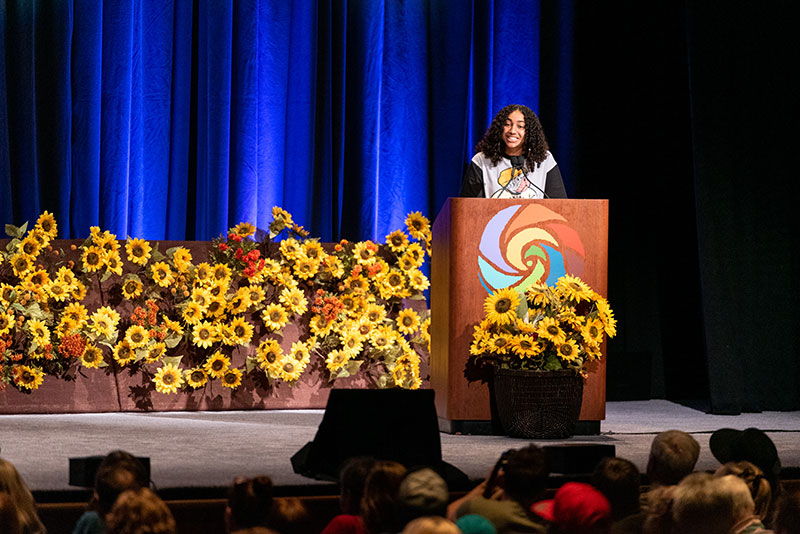
“Climate justice? That’s a white issue.” This was the initial response of high school freshman and West Oakland, California native, Isha Clarke when she was invited to attend a climate justice event. Fortunately, she went anyway, and it was during that event, a protest targeting a developer intent on building a coal terminal in her predominantly black, brown, and low-income hometown, that Clarke began to understand the concepts of environmental racism and injustice and recognize her own place in a movement that has historically lacked diversity.
“As a young woman of color, I have an ability to go into spaces where people look like me, and tell them, ‘this is what we’re facing, and you should get involved.’” Now a high school senior, Clarke is a founding member of Youth vs. The Apocalypse, which she describes as a youth organization seeking “to redefine the climate justice movement so that we can reverse the climate crisis and save the world.” Earlier this year, when a video went viral of Clarke and other youth activists urging California Senator Dianne Feinstein to take bold action on climate change and support the Green New Deal, Clark was propelled to the national stage. Those who have witnessed Clarke in action–at rallies, during media interviews, and in her recent Bioneers talk–would say she belongs there.
In her keynote at Bioneers, Clarke spoke of the social problems linked to the issue of climate change. “We must recognize that the fight against climate change is a fight against all of the systems of oppression that fuel the climate crisis,” she said, “white supremacy, racism, economic exploitation, greed… the list continues.” She challenged audience members to begin practicing this intersectionality on their own by examining their own privilege. “It may be white privilege, it may be class privilege, it may be privilege that you get from your citizenship status. How does that privilege influence how you think, how you act, what you feel comfortable saying, what you feel comfortable doing, how much you feel comfortable speaking, how often you choose to volunteer… We must always ask ourselves how we can use our privilege to provide a platform for others to claim their own power and voice.”
Demond Drummer, New Consensus
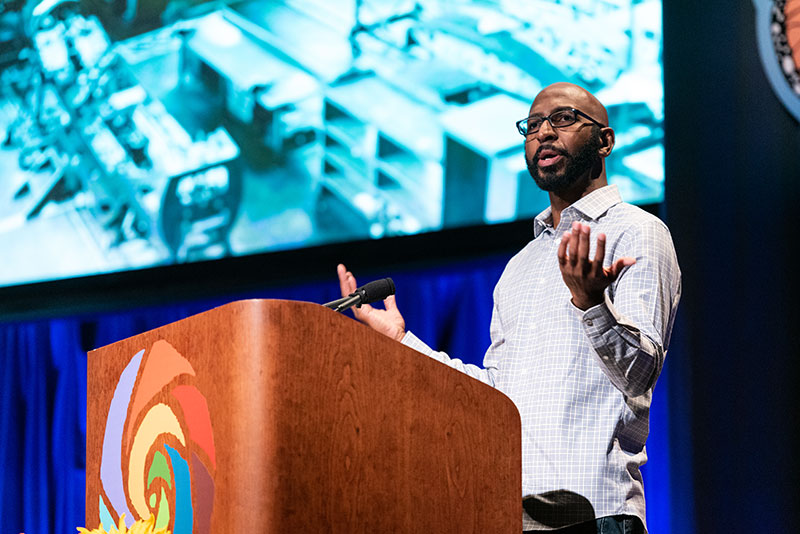
Many speakers and attendees at Bioneers spoke of the Green New Deal as a vehicle for a just transition to a regenerative economy, but how will it translate to action? This is a matter being addressed by many people, including Demond Drummer, Co-Founder Executive Director of New Consensus, the think tank working to turn the Green New Deal into a policy platform. Thanks to Drummer’s time as a field organizer for Barack Obama’s first presidential campaign, and his leadership as the co-founder of Chicago-based LargeLots.org, a community-driven effort to reclaim city-owned vacant lots, and co-founder of CoderSpace, a technology learning lab for high school students, Drummer knows how to transform ideas into action, and he is not daunted by the ambitious goals of the Green New Deal.
“The Green New Deal is not antithetical to the scale, scope, and ambition that this country has seen in other endeavors,” said Drummer in his Bioneers keynote address. To make this point, he spoke of the Green New Deal in three different respects. First, referencing America’s massive scale-up productive capacity during World Word II, he spoke of the Green New Deal as a mobilization. “The greatest generation mobilized our country to beat fascism abroad,” he said. “It is our task… to beat fascism right here at home and mobilize our country to meet the imminent and existential threat of climate breakdown.” Referencing John F. Kennedy’s moon mission speech at Rice University, he described the Green New Deal as a series of technology “moonshots,” which would be as much about survival as science. In speaking of the Green New Deal as a “movement of movements,” Drummer noted that its true strength comes from its comprehensiveness and its ability to address both the environmental and the social. “There is no way to truly transition to a zero-carbon economy,” he said, “without interrogating and challenging the logic of an economy that exploits people and extracts from the earth.”
“Mobilizations… moonshots… movements. That’s the story of America,” he said, concluding his talk at Bioneers, “and we in this room and in communities all across the country are writing the next chapter of the American story.”
Eve Ensler, Playwright, Performer, Activist
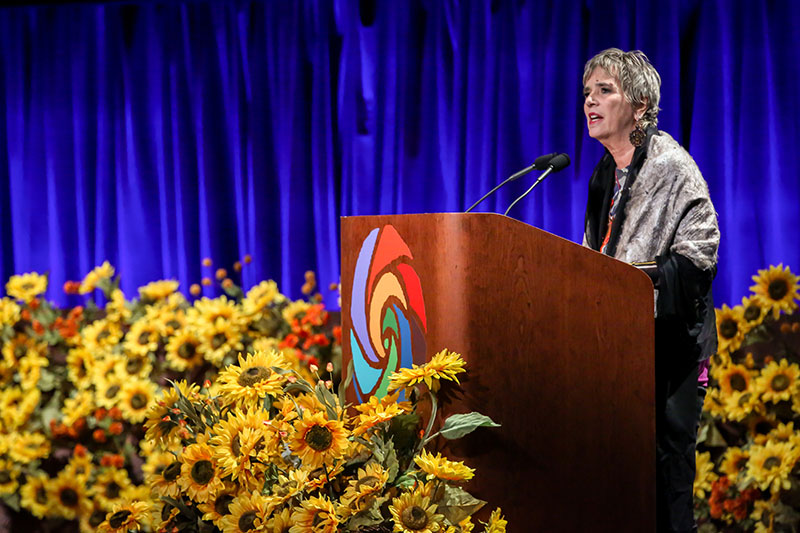
Even Ensler is best known for her Tony-Award-winning and groundbreaking play The Vagina Monologues. A powerful and prolific playwright, performer, artist, and activist, Ensler has devoted her life to stopping violence and advancing a vision of a world in which girls and women are free to thrive.
In opening her Bioneers keynote talk, Ensler revealed that as a child, she was repeatedly physically and sexually abused by her father. She spent much of her life waiting for an apology from him, which never came. She realized she was not alone. “In 16,000 years of patriarchy–and I have done a lot of research–I’ve never read or seen a public apology for a man for sexual or domestic abuse,” she said.
In her newest book, The Apology, Ensler created her late father’s apology by writing it herself. In the context of that endeavor, she spoke of the four stages of a proper apology: self-interrogation, detailed accounting and admission of the offence, empathizing with the victim, and taking responsibility. She also spoke of the transformative power of an apology. “I do believe that there is an alchemy that occurs with a true apology,” she said, “where your rancor and your bitterness and your anger and your hate releases when someone truly, truly apologizes.”
Ensler’s talk took a stunning turn when she confessed that in preparing to speak at Bioneers, she realized that she owed an apology to Earth. She then shared that apology, which brought the core of her story closer to home for the Bioneers audience.
Paul Hawken, Project Drawdown
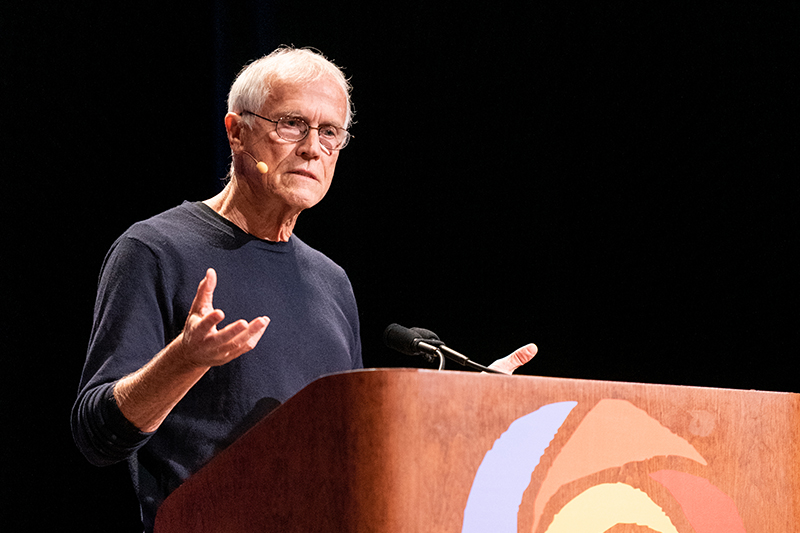
Paul Hawken, originator of Bioneers’ vision and philosophy, first spoke on the Bioneers stage in 1994 and consistently delivers vital updates to the extended community. A visionary entrepreneur, award-winning author, and world-famous environmental activist, Paul Hawken has dedicated his life to sustainability and changing the relationship between business and the environment. This year, Hawkens’ Bioneers keynote centered around Project Drawdown, the global research nonprofit he founded to identify, review, and analyze viable solutions to reverse global warming, along with the book that communicates these finding to the masses, aptly titled Drawdown. Disappointed by the shortcomings of climate mitigation plans focused on stabilizing carbon emissions, Hawken started Project Drawdown to find feasible solutions to draw carbon down from the atmosphere and back into the earth. To do this, he put together a diverse and collaborative team of 60 Drawdown Fellows representing 21 countries. The Fellows evaluated more than one-hundred solutions, then conducting full literature reviews and modeling for 80 of them. Third-party scientific advisors then tested the models.
The results were surprising. As Hawken put it, the Project Drawdown findings “took the climate establishment and rocked them back on their heels.” For example, the solution that showed the greatest potential to reduce atmospheric CO2 was the effective management and disposal of chemical refrigerants. For comparison, restoring 435 million acres of tropical forest ranked 5th and increasing electric vehicles by 16% by 2050 ranked 26th.
Hawken spoke of the significance of language in the climate movement. In the very naming of his project, and in sharing the results in Drawdown, Hawken was careful to avoid the mistake made by many climate change communicators: using language that does not resonate with mainstream audiences and separates people from the issue. “I mean, mitigation,” he said, citing an example. “Who wakes up in the morning and says, God, I can’t wait to go mitigate today?”
Hawken concluded his talk by posing a compelling question: “Is this a blessing or a curse?” he asked. “I say global warming is a blessing. It’s feedback from this extraordinary system we call planet Earth, and anytime you ignore feedback, a system dies. Right? That’s what feedback is for, it’s how life sustains itself and grows and changes.”
Casey Camp-Horinek, Ponca Tribe of Oklahoma
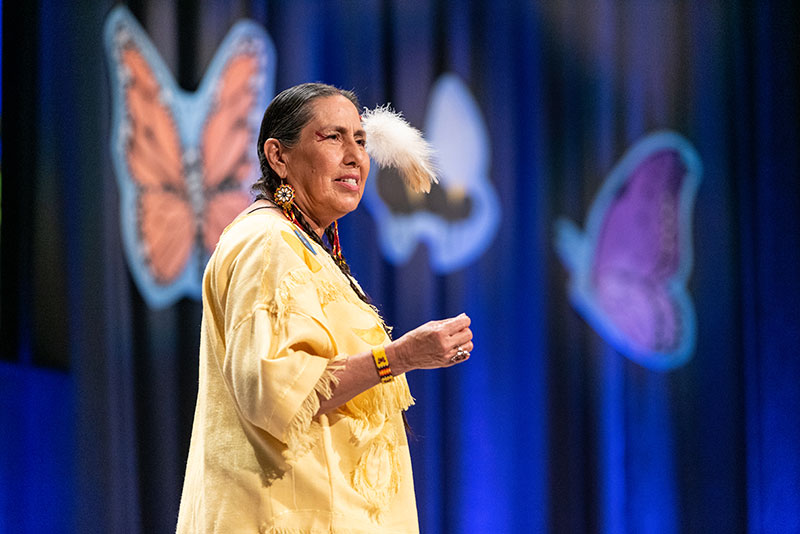
In 2018, the Ponca Tribe of Oklahoma became the first tribe in the U.S. to enact a resolution recognizing the rights of nature. In part a protective measure against the impacts of fracking, the resolution included the right to take accused offenders of that resolution to tribal—rather than state or federal—court. A major force behind this action was tribal Councilwoman Casey Camp-Horinek. An elder, author, actress, and activist, Camp-Horinek knows how to command attention and get results.
After stepping onto the Bioneers stage to deliver her keynote address, Camp-Horinek stood silent for more than 30 seconds. In her hands, she held a small glass of water. When she began to speak, she did so not to the audience, but to the water. My relative,” she said, “you are everything. You are life itself.”
Camp-Horinek then shared the Ponca story of the first human. This origin story illuminates the Ponca people’s way of being: as part of a sacred system of life in which all breath is shared. Upon finishing the tale, she reminded the audience that all humans are part of this system. “That is us. That is you. That is I,” she said.
With that awareness, she said, comes accountability. “Now what?” she asked. “If you realize that you’re this embodiment… what further responsibility will you take?”
Camp-Horinek called upon the audience to follow the lead of the Ponca and other communities around the world that are enacting laws to protect the rights of nature. “Go to your local government. Go to your federal government and say: We are part of nature. We want you to enact these laws,” she said. “And if they don’t do it, you do it.”
Valarie Kuar, Revolutionary Love Project
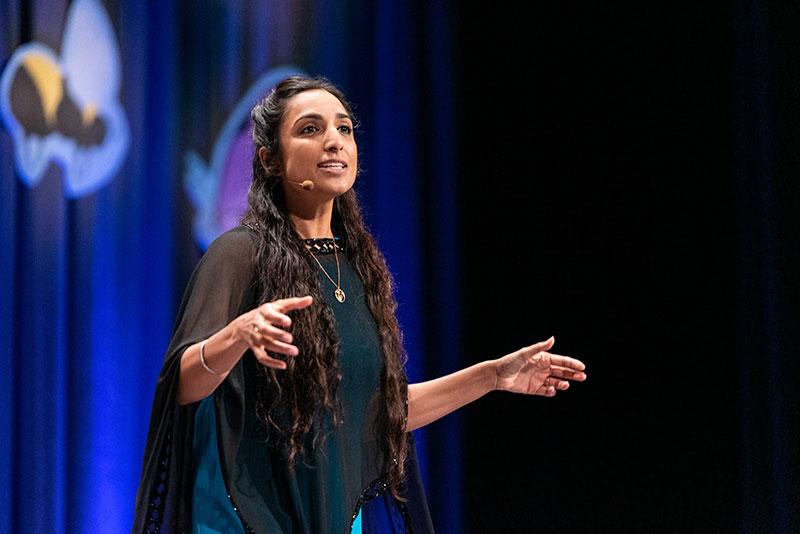
Valarie Kaur, a Sikh American who had grown up on a farm in California, was studying religion and international relations in college when America was attacked on September 11, 2001. Four days later, a family friend, a Sikh man, became the first victim of a post-9/11 hate crime when he was murdered at a gas station. This incident propelled Kaur on a lifelong journey to defend civil rights and champion love as a force for social change. She began this journey with a camera, traveling the country and documenting hate crimes against Sikh and Muslim Americans. In 2008, she co-produced the film Divided We Fall: Americans in the Aftermath. After earning her Master’s in theological studies, Kaur attended Yale Law School, where she founded the Yale Visual Law Project, which trains law students to use visual content as a tool for advocacy. In addition to being a filmmaker, she is now a lawyer, faith leader, activist, and Senior Fellow at Auburn Theological Seminary.
At one point in her Bioneers talk, Kaur described her mother and maternal ancestors whispering in their native tongues, “you are brave,” to ease her through the final stage of labor preceding her son’s birth. This final stage, and the intense pain that goes with it, is referred to as “transition.” “What if,” she then asked, “the darkness in our country right now, in the world right now, is not the darkness of the tomb, but the darkness of the womb?… What if this is our time of great transition?”
Kaur spoke of her most recent work, the Revolutionary Love Project, to help the world proceed through this dark transition. Created to prepare and inspire movements and communities to practice an ethic of love to conquer hate and create positive change, the Revolutionary Love Project provides tools, such as films, workshops, talks, and events. Three key practices guide the project and others to conduct a non-violent transition: 1. “see no stranger,” recognize that we are all connected and interdependent; 2. “tend the wound” in ourselves and in others by practicing wonder and forgiving the blinding forces of grief and rage; 3. “breathe and push” through all of our labors.
Brandon King, Cooperation Jackson
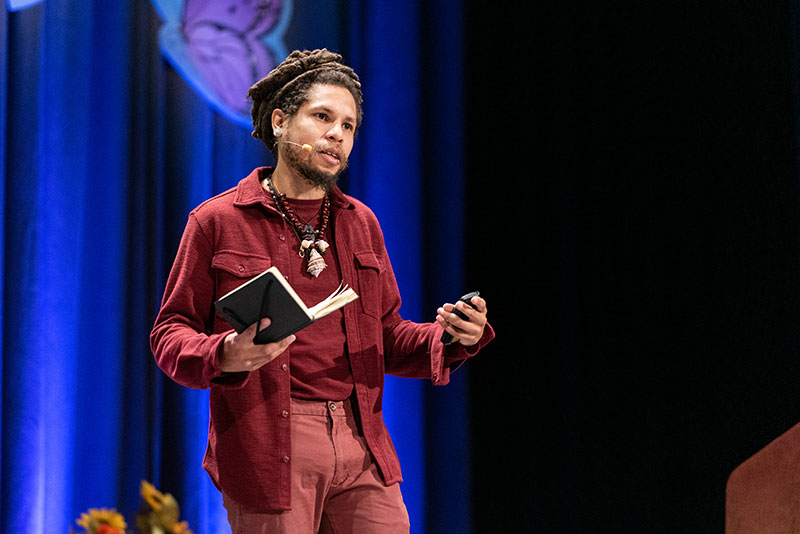
In Jackson, Mississippi, a city facing a 28.9% poverty rate and a lingering legacy of racism, an exciting, grassroots experiment is underway, known as Cooperation Jackson. By shifting the resources, wealth and power of African American communities to the people of those communities, the program is able to combat the forces of capitalism and gentrification by creating a network of cooperatives. Launched in 2014, but with roots that extend decades back into the New Afrika movement, Cooperation Jackson is emerging as an example of what community might look like on the other side of a transition from an extractive, exploitative economy to one that is just, regenerative, and life-affirming.
Helping to guide this experiment is one of its founding members, Brandon King. A farmer, DJ, artist, community organizer, and former union organizer, King described his work as “building deep democracy,” when he spoke to the audience at Bioneers. He emphasized Cooperation Jackson’s whole-systems approach to creating a new economy, through the networked cooperatives that provide food, housing, education, banking, culture, and the production of goods. “If we provide the things we need in order to survive,” he said, “it makes us less dependent on the systems that are harming us.”
They are beginning to do just that. Currently, Cooperation Jackson operates an urban farming coop, a “Green Team” landscaping and composting cooperative, a community education center, and a community production center with a maker’s space. Both centers use rooftop solar panels. All of these elements of the Cooperation Jackson network are located within a community land trust that includes 50 lots and several commercial properties. There are plans to sustainably renovate an apartment building and vacant homes. They recently completed the first stage of a concept for zero-waste eco-village pilot. While Cooperation Jackson aims to inspire more initiatives that promote life-affirming economic democracy elsewhere, King recognizes the need for such initiatives to come from the ground up. “A principle of just transition is local communities figuring out what solutions work best for them.”
Julian Brave NoiseCat, Data for Progress
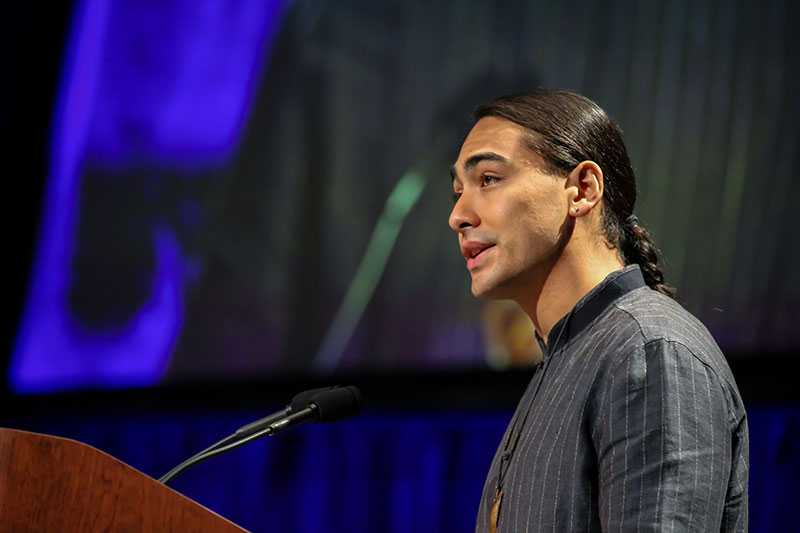
Julian Brave Noisecat, a member of the Canim Lake Band of the of the Shuswap Nation, is Vice President of Policy & Strategy at the think tank, Data for Progress. He is also an award-winning journalist, the former Acting Policy Director for 350.org, and a contributing architect of the Green New Deal.
At Bioneers, NoiseCat spoke of the Alcatraz Canoe Journey, an event that had taken place a few days earlier, on Indigenous Peoples Day. NoiseCat had helped organize the event, which drew together tribes and First Nations from the western coast of the U.S. and Canada to paddle traditional canoes around Alcatraz Island in honor of the 50th anniversary of the 1969 Native American occupation of the island. The occupation brought about a shift in federal policy toward one of self-determination and sovereignty for Native Americans. NoiseCat and other organizers created the Canoe Journey to inspire a new generation of youth and indigenous leaders, as well as educate the public about the Alcatraz Occupation and the enduring importance of First Peoples in the context of global environmental crisis.
NoiseCat spoke of the leader of the 1969 occupation, Richard Oaks, who envisioned Alcatraz as “a former federal prison reclaimed by Indians of all tribes as a symbol of our rights, our pride, and our freedom.” While NoiseCat lamented the fact that today, over a million people visit Alcatraz not to experience that symbol, but to “peer inside jail cells,” he recognized the Canoe Journey’s potential to instigate a change in mindset. “For a day, or maybe even just a morning,” he said, “the canoes made it possible to see Alcatraz as what it could be, a symbol of indigenous rights, resistance, and persistence, … an idea, a story, and a moment of organized action that changed history.”
He continued, “As our people and all people face devastating crises, catastrophic climate change, growing inequality, revanchist hate, maybe the power of audacious and enduring indigenous ideas like Alcatraz are exactly what we need.”
Leila Salazar-López, Amazon Watch
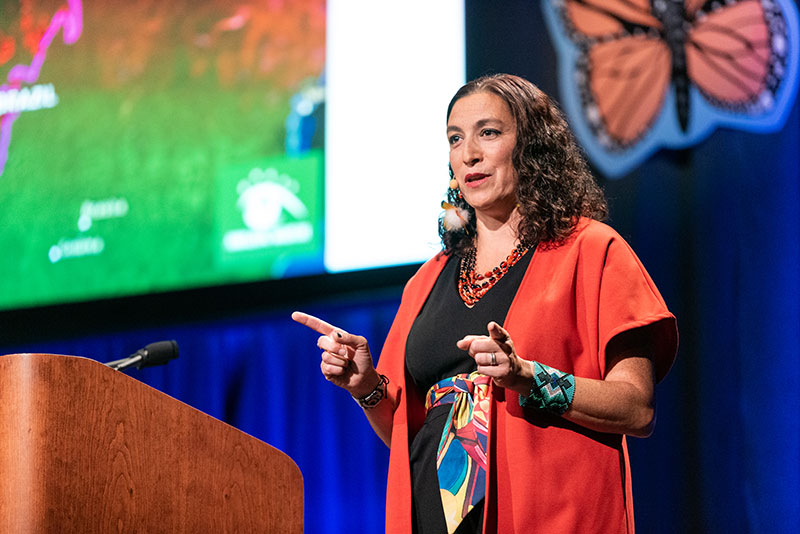
When Leila Salazar-Lopez traveled from her home in Southern California to the Amazon at the age of 21, she intended to study ethnobotany. After meeting indigenous people and learning about the “living library” of the Amazon, however, she decided to devote her career to protecting it. Now the Executive Director of Amazon Watch, she is doing just that. Salazar-Lopez describes herself as a Mexican-American (Chicana) woman, mother, and defender of Mother Earth. But when it comes to challenging the corporate and government powers that threaten the Amazon and protecting the indigenous peoples who call it home, she is simply a force.
Under her helm, and in partnership with indigenous communities, Amazon Watch focuses on three priorities: halting Amazon destruction, advancing indigenous solutions, and supporting climate justice. Currently a key focus of the organization is the advancement of the Sacred Headwaters Initiative, an indigenous-led effort to permanently protect the sacred headwaters of the Amazon, a 74-million-acre region considered to be the most biodiverse terrestrial ecosystem on the planet and home to more than 20 indigenous nationalities.
A great deal of Salazar-López’ talk at Bioneers addressed the devastating fires that have raged through the Amazon region this year–fires she described as “intentional and malicious…set by economic drivers and policies” enacted by Brazilian President Jair Bolsanaro. In stressing the urgency of the destruction and its global impact, she told the audience, “We have to act as if our health is on fire.”
As for what to do, Salazar-López was clear in her directive, “The best way to protect the Amazon is to stand with indigenous peoples.” She reminded the audience that while indigenous people represent a small percentage of the global population, they steward 80% of Earth’s biodiversity.
Bill McKibben, 350.org
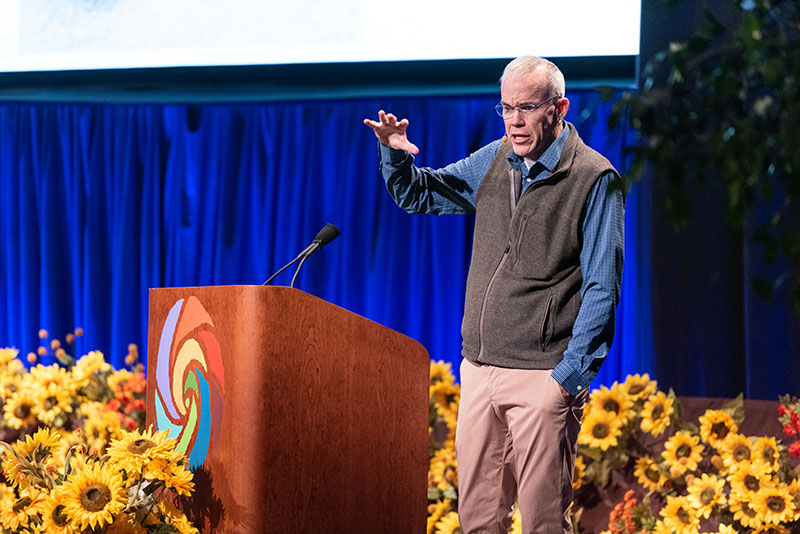
Thirty years ago, Bill McKibben awakened much of the world to the cataclysmic impact of human influence on the planet with his book The End of Nature. Despite humankind’s failure to halt this destructive trajectory in the years since, McKibben remains—as Bioneers co-founder, Kenny Ausubel described him—“an improbable optimist.” In addition to authoring 16 more books, writing for such noted publications as National Geographic and Rolling Stone, and becoming the Schumann Distinguished Scholar in Environmental Studies at Middlebury College, McKibben founded 350.org, the first global grassroots climate change movement.
McKibben began his Bioneers talk by sharing photos from an expedition he took to Greenland last year to film Kathy Jetñil-Kijine, a Marshall Islands native, and Aka Niviâna, a Greenland native, as they stood atop a melting sheet of ice and recited their co-written poem “Rise.” He told the audience that as the group’s boat was approaching the coast, which was about two miles away, a chart he was referencing positioned the boat on solid land. The boat’s captain explained the chart was five years old, and at the time it was made, “everything was frozen as far as you could see.” “Even for me…as long as I have been thinking about all this,” said McKibben, “it’s hard sometimes to imagine how fast it’s happening.”
The tone of McKibben’s talk then shifted from profound urgency to the optimism for which he is known. “In the last 10 years, we’ve watched the price of a solar panel and a wind turbine just plummet,” he said. “We’re in a position now to really move.” He noted the massive expansion of the movement, and the fact that seven million people participated in September’s Global Climate Strike. And while he praised the work of Greta Thunberg and others of her age, he said, “There is something undignified about taking the biggest problem in the world and assigning it to junior high school students.”
As for where adults can pick up some slack, McKibben recommended broadening divestment action to include everyday citizens who interface with the large banks that fund the fossil fuel industry. Sharing data from the Rainforest Action Network, he revealed that JPMorgan Chase has lent $196 billion to the fossil fuel industry over the last three years. “Not everybody’s got a pipeline or a coal mine in their backyard to go fight, but you know what,” he posited, “Chase has conveniently located 5,000 branches across America in the highest traffic locations imaginable.”
David Orr (formely of Oberlin College)
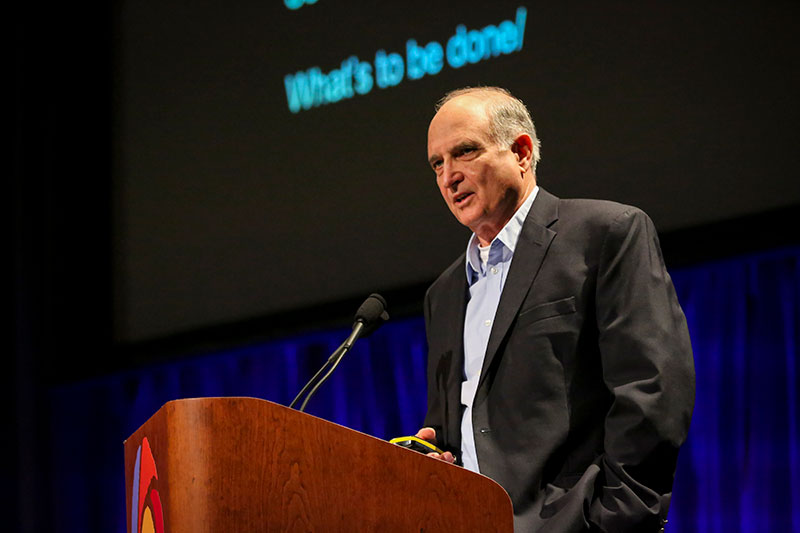
Former Paul Sears Distinguished Professor of Environmental Studies and Politics and senior adviser to the president of Oberlin College, David Orr is an environmental educator whose influence has extended far beyond the classroom. He helped launch the green campus movement when, in the 1980s, he organized studies of energy, water, and material use on college campuses, and in 1996, when he organized the effort to fund, design, and build the first green building on a U.S. college campus, Oberlin’s Adam Joseph Lewis Center for Environmental Studies. Through such leadership, and through his work as an author and activist, he became –and remains–a leading voice in the national dialogue on sustainability.
Orr’s forthcoming book Democracy Unchained: Politics as if All People Matter, focuses on the constructive changes necessary to make American democracy work for everyone and protect our common future. This was also the focus of his keynote talk at Bioneers. He began his talk by thanking President Donald Trump. After all, said Orr, “What he did was highlight everything that was wrong and needed to be fixed.” Aware of the ruptures, said Orr, we must first “bring democracy into the ER and stop the bleeding,” then figure out how to rebuild. This will not be easy work, he cautioned. “We’re all going to have to risk something,” he said, before reminding the audience of the power held by citizens to tell the truth. “This is all hands on deck time,” said Orr. “We don’t have the option of being apolitical.”
Jerry Tello, National Compadres Network
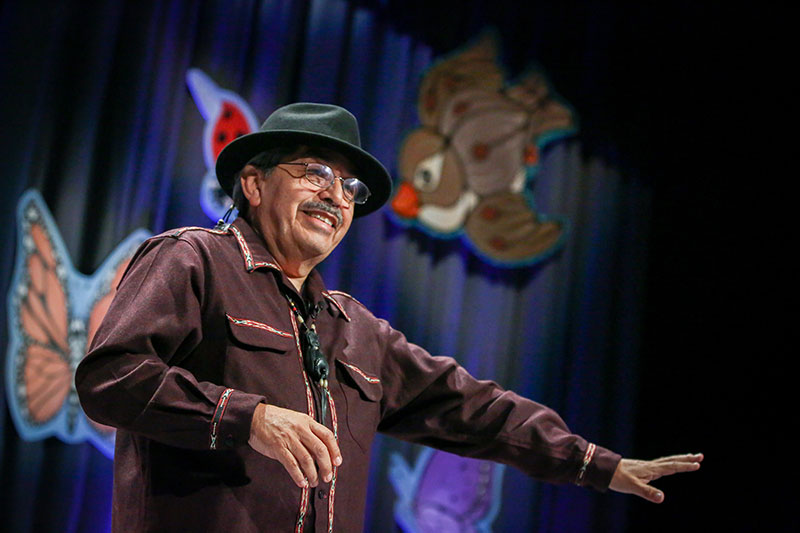
Jerry Tello is a healer. The founder and Director of Training and Capacity Building for the National Compadres Network, a nonprofit organization focused on strengthening communities of color, he is a celebrated leader in the transformational healing of traumatized men and boys of color. He has authored numerous articles, videos, and curricula addressing fatherhood, youth rites of passage, culturally-based family strengthening, and healing the healer. He has helped to provide domestic violence awareness, healing, and support services to military veterans. Tello is also the co-founder and director of the Sacred Circles Center, a gathering place offering indigenous and culturally-based healing and wellness programs.
In his Bioneers talk, Tello’s “medicine” came in the form of story. With humor, he spoke of his childhood and growing up in the Compton neighborhood of Southcentral Los Angeles. “I didn’t know we were poor because my mama never said we were poor. She just said, ‘eat those beans.’” He spoke of his Mexican Tarahumara grandmother, who, after rising at 4:00 a.m. every day to talk to her plants and pray, would awaken him at 5:30 AM to bless him. “I used to hate it,” he said. “’Grandma, why are you waking me so early… You messed up my dream, Grandma… Why do you always got to bless me?’”
Tello’s talk then pivoted to poignancy. “My grandma knew something that I didn’t know,” he said. “She knew that I would go into a world that was not going to see me as a blessing. That many times just because of the color of my skin or how I was dressed, or my hair, or how I looked, they already had a plan to lock me up or deport me… My grandma knew that this world was wounded and didn’t appreciate what we call in my language In Tloque Nahuaque, which means interconnected sacredness… So she blessed me up. And she blessed me every day and as many times as she could.” Tello ended his talk by challenging audience members to acknowledge their own sacredness and to “take the opportunity where we can to bless each other up.”
Heather McTeer Toney, Moms Clean Air Force
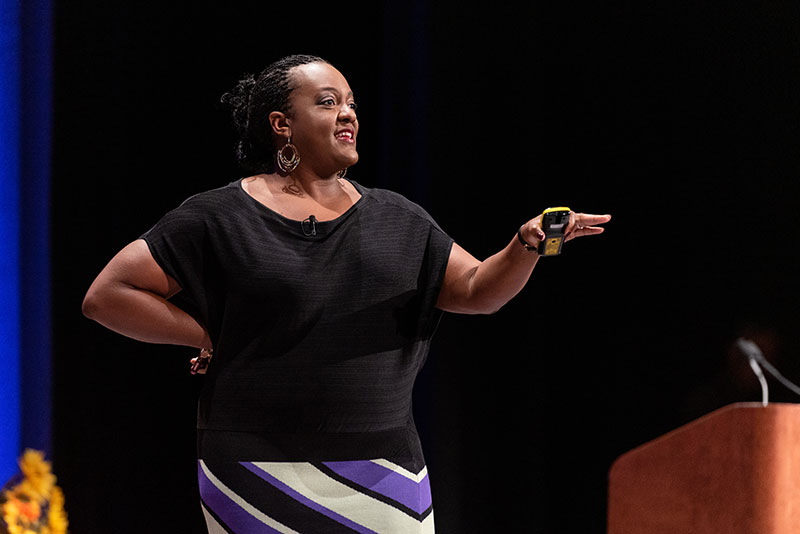
Some leaders are known for breaking new ground. Some for their ability to create and implement solutions. Some simply know how to navigate the systems that can fuel or hinder their progress. Heather McTeer Toney is known for all of these things. In 2004, she became the first African-American, first female, and youngest mayor of Greenville, Mississippi. McTeer Toney ran for office after earning her law degree because she felt the need to do something about the poverty and problems plaguing her hometown. During her two terms as Mayor, she did just that, helping her city emerge from substantial debt and obtain millions of dollars in grants and federal assistance. She also gained the attention of President Obama, who later appointed her as Regional Administrator for Environmental Protection Agency’s Southeast Region.
In her current role as National Field Director for Moms Clean Air Force, McTeer Toney helps guide a community of over 1,000,000 parents fighting to combat air pollution. Much of her talk at Bioneers focused on the need to educate, advocate, and act at the community-level and bring the innate skills and action-oriented power of motherhood to the table in addressing climate change and the social challenges with which it is linked.
“We are going to protect our babies to no end,” she said. “Whether we are protecting them from the impacts of climate, or we are protecting them from gun violence, we are protecting all of our children, and we recognize that climate has something to do with all of it.”
In referencing the IPCC’s 2018 Special Report, she stressed the pressing need to act now. “We’re realizing that our voices are required at this moment,” she said. “It’s like when you hear the kids in the back room, and they’re making a whole lot of noise. That’s all right. But when you hear something break, and it gets eerily silent, you know you have to get up and go into that room. What we’re saying as mothers is that we are now getting up and going into the room.”
Terry Tempest Williams
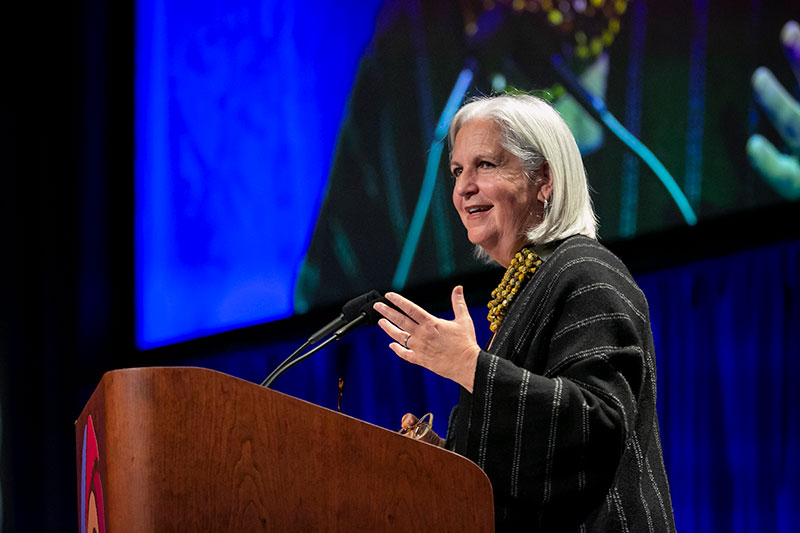
During her prolific career as a creative non-fiction writer and conservationist, Terry Tempest Williams has consistently focused on the natural world and our role in it. A daughter of Utah’s desert landscapes who was raised with the Mormon tradition of journaling, Williams is a master storyteller with the unique ability to weave ecological concepts into narratives that compel and profoundly move the reader.
Williams has also been a staunch defender of wildlands. Her commitment to speaking out and taking actions on behalf of conservation has made her a hero to many, but has also resulted in the loss of her job at the University of Utah, where she’d been the founding chair of the Environmental Humanities Graduate Program. One institution’s loss was another one’s gain, and Williams now teaches at the Harvard Divinity School.
Williams’ newest book is entitled Erosion: Essays of Undoing, and her talk at Bioneers centered on the theme of erosion and evolution: of the land, of our democracy, of our civility, and of ourselves. She read an excerpt from the book, in which she discussed Castleton Tower, a 400-ft spire of Wingate Sandstone in Utah’s Castle Valley, where she lives. University of Utah geologists have been using seismology to measure energy and movement in Castleton Tower. Using low-frequency seismic data, the scientists have been able to capture the sound of that energy. Williams played a recording of that sound and its resemblance to a human heartbeat was unmistakable. Its rhythm resonated through the auditorium, and the power of the moment was palpable. “Castleton Tower has a pulse,” she said. “Earth has a pulse. As do we. No separation… We are eroding and evolving together. “
